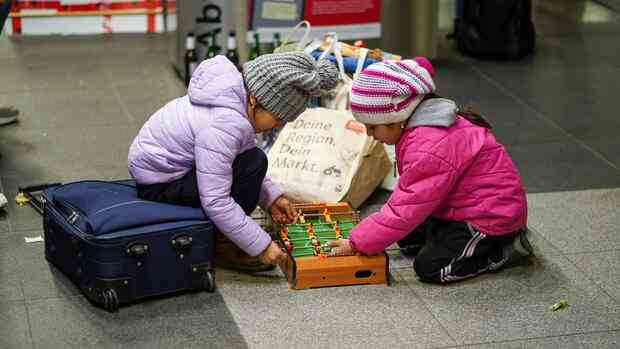Berlin Federal Interior Minister Nancy Faeser (SPD) had high expectations of the refugee summit. In view of the increasing number of people they have to take in, many towns and communities have long since reached the limits of their capacity. But there was no agreement on a central question: the financing of the refugee costs.
After about four hours of consultations with representatives of the federal states and the municipal umbrella organizations, Minister Faeser made it unmistakably clear that there would be no further financial support from Berlin for the care of the refugees, including those from Ukraine.
Faeser emphasized that after the start of the Russian war of aggression against Ukraine, the federal government had always stood “closely on the side of the federal states and local authorities”. Even before the summit, the minister blocked calls for new billions in federal aid for the accommodation and care of the refugees – with reference to the already promised 3.5 billion euros for 2022 and another 2.75 billion euros for 2023. After the meeting, the SPD politician, there is a clear timetable for negotiating finances again with the Chancellor and the Prime Minister – around Easter.
The President of the German District Association, Reinhard Sager, who also attended the summit, reacted visibly with a cold. It is a “great disappointment” that the federal government is not prepared to continue to support the municipalities financially, he said. This is also “particularly annoying” because the federal government ultimately decides how many people come to Germany and then have to be housed and cared for.
He reiterated that he would actually have preferred to speak to Chancellor Olaf Scholz (SPD) and, above all, about more money for the municipalities. “We urgently need relief now,” emphasized Sager. The pressure on the municipalities is increasing every day. Living space is limited and it is becoming increasingly difficult to find volunteers. Therefore, a “turning point” is also necessary when dealing with refugees.
Almost 47 percent more people seeking protection than in 2021
The concerns of the municipalities are no coincidence. In Germany, more people applied for asylum last year than at any time since 2016. According to annual statistics from the Federal Office for Migration and Refugees (BAMF), almost 218,000 people made such a request for protection in Germany for the first time. That was almost 47 percent more than in 2021.
>> Read here: Where refugees come to Germany from – the most important facts in eleven graphics
In addition, there are a large number of people seeking protection from Ukraine. So far, more than a million refugees have arrived in Germany from there. They did not have to apply for asylum. You receive temporary protection based on an EU directive.
In order to get the situation under control, there should now be better coordination in the accommodation and care of refugees. Faeser announced a digital “dashboard”, an overview of the migration, which in future should provide “transparency” down to the district level. Above all, it was possible for the first time to “agree on fixed work structures across all levels,” said the minister. Concrete results should be achieved by Easter in the areas of accommodation and finances, relief for the immigration authorities and streamlining of processes, better integration in the labor market and limitation of irregular migration.
>> Read also: Because of refugees at the limit: How a call for help from Hesse went unheard
The fact that progress is overdue here is not only emphasized by the municipalities. After the meeting in Berlin, the Hessian Minister of the Interior, Peter Beuth, said that the mood in the country was about to change. “It is therefore necessary that we find solutions quickly,” emphasized the CDU politician. Beuth added that not all problems can be solved with money. That is why it is also important to regulate migration to Europe more closely. Also when returning
Rejected asylum seekers must now move forward.
Scientist: Childcare must have high priority
Faeser agrees. With a view to the increasing number of asylum seekers from Turkey, Syria or Afghanistan, for example, the minister referred to the recent agreement between the EU heads of state and government to strengthen the protection of the external borders of the European Union. In addition, there must be a consistent deportation of rejected asylum seekers. To this end, the Federal Government’s new Migration Commissioner, the FDP politician Joachim Stamp, is to negotiate corresponding agreements with third countries. It is now necessary to break new ground, Stamp said at the press conference after the summit meeting. The agreements are intended to clarify deportations on the one hand and the immigration of skilled workers needed in Germany on the other.
Faeser after the refugee summit: “More control, more order and more repatriations”
There are already indications that the refugee issue could become a permanent task. In a recent study on the situation of Ukrainian refugees in Germany, around a third of those surveyed stated that they wanted to stay in Germany forever or for several years. A third want to return to Ukraine after the end of the war. With a share of 80 percent, it was mainly women who fled to Germany between the beginning of the war and June 2022, around half of them with underage children. Above all, the care of children and the language skills of adults have an impact on work in Germany.
Yuliya Kosyakova from the Institute for Labor Market and Vocational Research explains that there is a need for improvement, especially in the areas of psychosocial counseling and childcare. “Creating childcare facilities should be a high priority.”
More: The EU wants to increase the number of deportations
